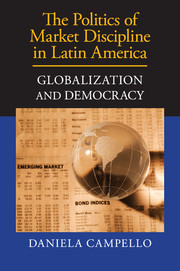Book contents
- Frontmatter
- Dedication
- Contents
- List of Illustrations
- List of Tables
- Acknowledgments
- 1 Globalization, Democracy, and Market Discipline
- 2 Between Votes and Capital: Redistribution and Uncertainty in Unequal Democracies
- 3 Investors' “Vote” in Presidential Elections
- 4 The Politics of Currency Booms and Crises: Explaining the Influence of Investors' “Vote”
- 5 Currency Crisis, Policy Switch, and Ideological Convergence in Brazil
- 6 Exogenous Shocks and Investors' Political Clout in Ecuador
- 7 One President, Different Scenarios: Crisis, Boom, and Market Discipline in Venezuela
- 8 “Vivir con Lo Nuestro”: Default and Market Discipline in Argentina
- 9 Who Governs? Market Discipline in the Developed World
- 10 Conclusion: Markets' Vote and Democratic Politics
- References
- Index
9 - Who Governs? Market Discipline in the Developed World
Published online by Cambridge University Press: 05 April 2015
- Frontmatter
- Dedication
- Contents
- List of Illustrations
- List of Tables
- Acknowledgments
- 1 Globalization, Democracy, and Market Discipline
- 2 Between Votes and Capital: Redistribution and Uncertainty in Unequal Democracies
- 3 Investors' “Vote” in Presidential Elections
- 4 The Politics of Currency Booms and Crises: Explaining the Influence of Investors' “Vote”
- 5 Currency Crisis, Policy Switch, and Ideological Convergence in Brazil
- 6 Exogenous Shocks and Investors' Political Clout in Ecuador
- 7 One President, Different Scenarios: Crisis, Boom, and Market Discipline in Venezuela
- 8 “Vivir con Lo Nuestro”: Default and Market Discipline in Argentina
- 9 Who Governs? Market Discipline in the Developed World
- 10 Conclusion: Markets' Vote and Democratic Politics
- References
- Index
Summary
The previous chapters disputed the conventional wisdom that markets have a strong capacity to constrain left-leaning governments in emerging economies.
The experiences of Brazil, Ecuador, Venezuela, and Argentina reveal how market discipline varies substantially over time and among countries, with most of this variation depending on factors that are exogenous to governments' and investors' choices – fluctuations in commodity prices and international interest rates.
Whereas bondholders' influence on economic policymaking is certainly substantial in periods of dollar scarcity, it is rather limited when commodity prices are high and international interest rates are low, and Latin American emerging markets experience abundant inflows of foreign currency.
In Ecuador, Rafael Correa defaulted on what he considered “illegitimate” public debt and renegotiated utility contracts in extremely favorable terms when remarkably high oil prices released the government from the necessity of building market confidence. This happened only a few years after his predecessor Lucio Guitérrez, elected on a similar agenda but under strong currency pressures, embraced a surprisingly orthodox program to receive an International Monetary Fund (IMF) loan expected to reopen Ecuador's access to international financial markets.
During a commodity boom, the government of the Justicialista Néstor Kirchner in Argentina intervened to lower interest and exchange rates, increased social spending, and nationalized key sectors of the economy, policies that conflicted with markets' preferences, while still maintaining risk levels comparable to the “well-behaved” Brazil. A decade earlier, a government of the same Partido Justicialista had advanced one of the most encompassing neoliberal programs in Latin America, boosting market confidence and managing to attract substantial inflows of capital in a period when they were desperately needed throughout the region.
I argued that variation in the effectiveness of market discipline between good and bad times is related to changes in the demand and supply of foreign funding available to governments in each scenario.
When commodity prices are low, Latin American low-savings-commodity-dependent economies slow down, hard currency becomes scarce and public revenues fall, forcing governments into searching for additional funds in international financial markets to meet their external financial obligations.
- Type
- Chapter
- Information
- The Politics of Market Discipline in Latin AmericaGlobalization and Democracy, pp. 188 - 213Publisher: Cambridge University PressPrint publication year: 2015

